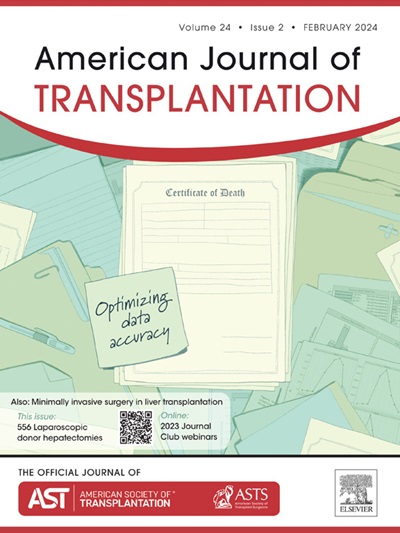脂蛋白肾小球病移植后复发4例报告并文献复习。
IF 8.2
2区 医学
Q1 SURGERY
引用次数: 0
摘要
脂蛋白肾小球病(LPG)是一种由APOE基因致病性变异引起的超罕见肾脏疾病。虽然肾活检表现出典型的结果,如毛细血管袢扩张含有脂蛋白血栓,但明确的诊断需要APOE的分子遗传学分析。目前还没有针对这种疾病的特异性治疗方法,在肾小球脂蛋白沉积紊乱的情况下,这种疾病可能在肾移植后复发。在此,我们报告了4例巴西患者的移植后LPG复发,包括1例早期复发(移植后第一年)和3例晚期复发。2例患者携带APOE京都变体,2例携带APOE大阪/仓城变体。如前所述的病例一样,尽管使用了他汀类药物和抗蛋白尿药物,但临床反应是不均匀的,包括蛋白尿缓解或持续,以及进展到不同阶段的慢性肾脏疾病。这些病例强烈支持对疑似液化石油气病例进行分子遗传学调查,即使在拉丁美洲人群中也是如此,因为确诊的诊断提高了移植肾中疾病复发的可能性,并可为选择潜在的活体肾脏供体提供有价值的信息。本文章由计算机程序翻译,如有差异,请以英文原文为准。
Post-transplantat recurrence of lipoprotein glomerulopathy: report of 4 cases and literature review
Lipoprotein glomerulopathy (LPG) is an ultrarare kidney disorder caused by pathogenic variants in the APOE gene. Although kidney biopsy presents typical findings, such as dilated capillary loops containing lipoprotein thrombi, definitive diagnosis requires molecular genetic analysis of APOE. There is no specific treatment for the disease, and, in the scenario of a disorder with glomerular lipoprotein deposition, it may recur after kidney transplantation. Herein we reported 4 cases of post-transplant recurrence of LPG in Brazilian patients, including 1 case of early relapse (in the first year following transplantation) and 3 cases of late relapse. Two of the patients had the APOE Kyoto variant, while 2 harbored the APOE Osaka/Kurashiki variant. As in previously described cases, the clinical response was heterogeneous despite the use of statins and antiproteinuric agents, with proteinuria remission or persistence and progression to different stages of chronic kidney disease. Such cases strongly support the molecular genetic investigation of cases suspected of LPG, even in a Latin American population. A confirmed diagnosis can raise the likelihood of disease recurrence in the kidney graft and provide valuable information for selecting a potential living kidney donor.
求助全文
通过发布文献求助,成功后即可免费获取论文全文。
去求助
来源期刊
CiteScore
18.70
自引率
4.50%
发文量
346
审稿时长
26 days
期刊介绍:
The American Journal of Transplantation is a leading journal in the field of transplantation. It serves as a forum for debate and reassessment, an agent of change, and a major platform for promoting understanding, improving results, and advancing science. Published monthly, it provides an essential resource for researchers and clinicians worldwide.
The journal publishes original articles, case reports, invited reviews, letters to the editor, critical reviews, news features, consensus documents, and guidelines over 12 issues a year. It covers all major subject areas in transplantation, including thoracic (heart, lung), abdominal (kidney, liver, pancreas, islets), tissue and stem cell transplantation, organ and tissue donation and preservation, tissue injury, repair, inflammation, and aging, histocompatibility, drugs and pharmacology, graft survival, and prevention of graft dysfunction and failure. It also explores ethical and social issues in the field.

 求助内容:
求助内容: 应助结果提醒方式:
应助结果提醒方式:


